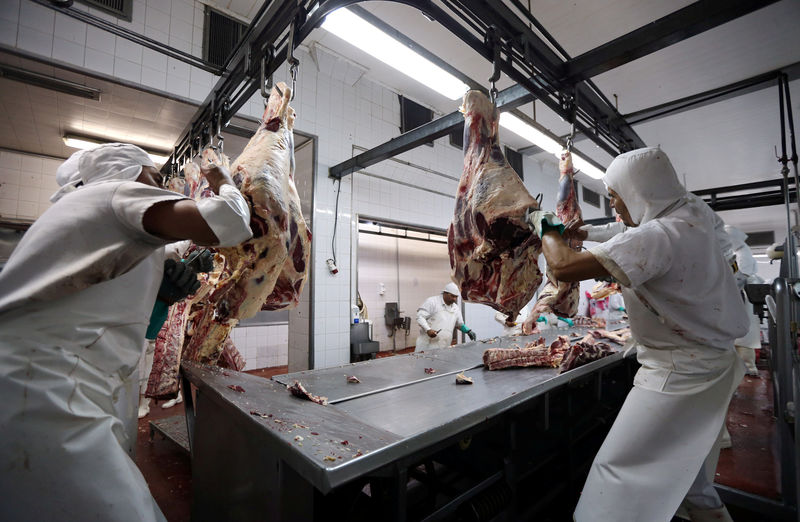By Hugh Bronstein, Cassandra Garrison and Tom Polansek
BUENOS AIRES/CHICAGO (Reuters) - Argentina is on the verge of signing a deal with the United States that would allow two-way trade of fresh beef for the first time in nearly two decades, the South American country's international trade secretary, Marisa Bircher, said.
The agreement, expected to be signed within days, would simultaneously open beef imports to both countries, Bircher told Reuters in an interview.
"We are negotiating the reopening to happen over the days ahead," she said. "All the technical and administrative questions have been settled."
At a time when the South American nation is seeking to boost beef sales abroad, the agreement would allow Argentina to show other prospective buyers that its meat is healthy enough to enter a country with some of the world's toughest sanitary protocols.
The deal would also open a new market for the U.S. cattle sector, although demand for U.S. beef is low in Argentina. The country is famous for its quality steaks, some tender enough to be cut with a spoon, as demonstrated with a flourish by waiters in the iconic steak houses of Buenos Aires.
Argentina will have a 20,000-tonne limit on its exports to the United States, Bircher said, while there will be no limit on U.S. beef going to Argentina.
The U.S. Department of Agriculture and the U.S. Trade Representative's Office in Washington declined to comment. The U.S. embassy in Buenos Aires did not respond to a request for comment.
U.S. beef passed a bureaucratic hurdle needed to access Argentina last week, according to a notice posted on Wednesday on the U.S. Department of Agriculture's Food Safety and Inspection Service website.
But before any U.S. beef can be exported to Argentina, meat companies need to register their products, processing plants and labels with Argentina’s National Service for Agrifood Health and Quality, said Joe Schuele, spokesman for the U.S. Meat Export Federation, a trade group.
The USDA's Animal and Plant Health Inspection Service formally approved imports of fresh beef from northern Argentina in 2015, according to a document posted in the U.S. Federal Register.
The USDA still needs to certify Argentine processing plants that would ship meat to the United States to make sure they meet safety standards, said Bill Bullard, chief executive of U.S. cattle producers' group R-CALF USA.
"Opening the border to raw beef from Argentina is certain to put downward pressure on U.S. cattle prices, and meat packers will be able to use this cheaper, undifferentiated beef as a direct substitute for beef produced by U.S. cattle producers," he said.
CATTLE DISEASE
Bircher said Argentina stopped exporting beef to the United States about 17 years ago due to U.S. concerns about contamination of Argentine cattle by foot-and-mouth disease.
"We have eliminated that through a vaccine program in our livestock sector," she said.
Another senior Argentine official, speaking on background, confirmed that Argentina and the United States were "close" to striking a deal. The last time the United States sent fresh beef to Argentina was in 1999, according to Argentina's official statistics agency.
Once one of the world's top five beef suppliers, Argentina was hobbled under the anti-farm policies of the country's previous president, Cristina Fernandez. The country fell off the top 10 list of beef exporters during her eight-year presidency.
It is back in the top 10, according to USDA data and could get into the top five next year thanks to the free-market policies of President Mauricio Macri and a sharp weakening of the local peso currency this year.
The United States produced 11.9 million tonnes of beef last year and exported 1.3 million tonnes, according to USDA data.
Argentina produced 2.8 million tonnes of beef and veal in 2017, exceeding its domestic consumption by 293,000 tonnes in 2017.
It is a delicate time for the world food system. Traditional trade routes of grains and oilseeds have been interrupted by a trade war between Washington and Beijing, and the world's two biggest economies are now looking for new commercial partnerships to strengthen their positions.
